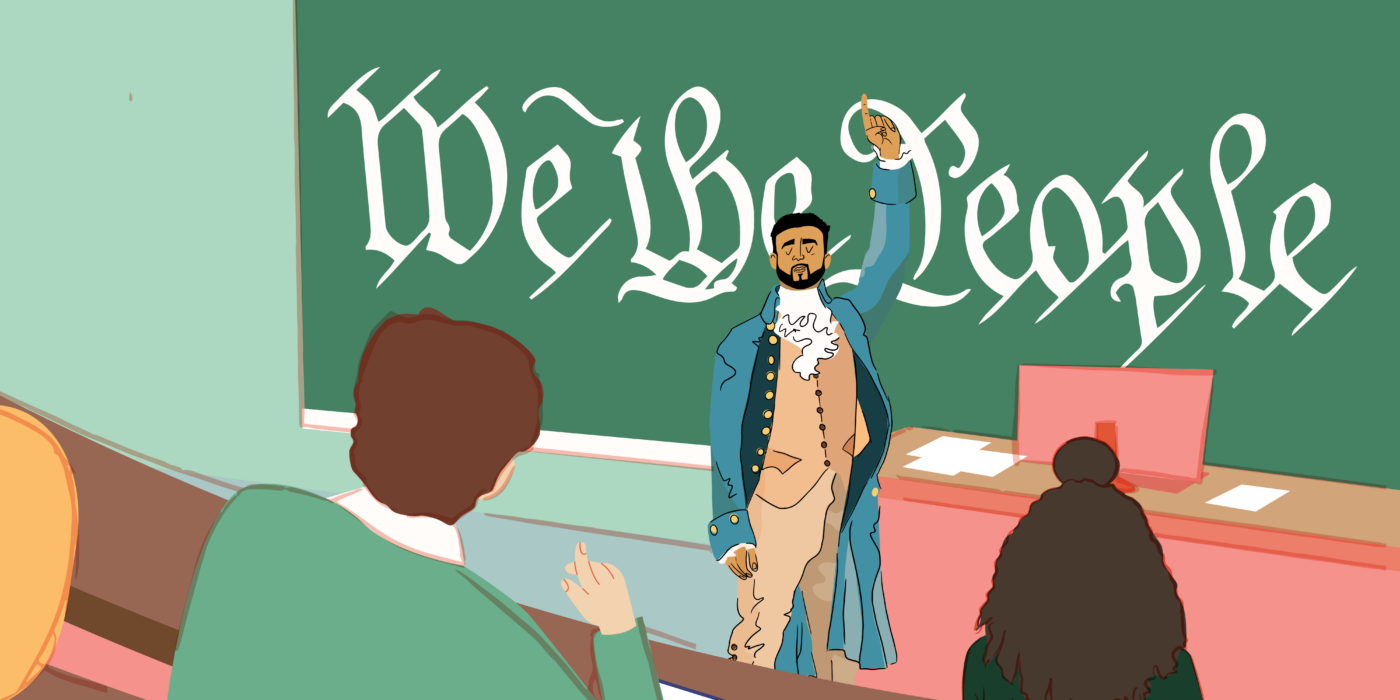When Peter Kastor, the Samuel K. Eddy Professor, needed a topic for a seminar that teaches history majors how to be historians, he chose history’s man of the moment: Alexander Hamilton.
“I wanted to create a course on how to examine the histories of politics and of policy in early America,” says Kastor, professor of history and also American culture studies in Arts & Sciences. “At the time, Hamilton, the musical, had just hit. So I said, ‘I’m going to shape the course around Alexander Hamilton.’ Students know who he was.
“Not only was Hamilton a very important political figure, he was also a very important policy-making official.”
Hamilton the politician helped build the coalition that secured ratification of the U.S. Constitution in the 1780s, crafted crucial legislation during George Washington’s administration and became one of the founding leaders of the Federalist Party.
“He, as much as anyone, determined the outcome of the election of 1800,” Kastor says. “He had a deep belief that he had a right and a responsibility to shape American politics.”
Meanwhile, Hamilton the policymaker, as secretary of the treasury, was tasked with finding ways to convert the United States from a place of fiscal crisis, unpayable debts, extraordinary volatility and no credit on international markets into a place of fiscal stability, prosperity and active trading relationships with other nations.
“He did all of those things in six years,” Kastor says.
To learn historical research methods and delve into the political culture of the era, students examine a wide range of primary sources. In one assignment, students read digitized newspapers to understand the election of 1800. In another, they conduct a quantitative analysis of federal employees. One assignment invites students to compare the timeline of the musical to actual events. (See sidebar on pg. 13.)
Also, students read letters Hamilton received from people requesting jobs in the fledgling U.S. treasury department. “The first thing students always conclude is that they would never write an application letter the way it was written in the 1790s. Applicants would spend half a page apologizing, describing how much they had suffered, and only at the end would they say what they wanted,” Kastor says.
Then students write their own job request letters in longhand, using the cultural norms and language of the time. “I’m amazed by the students’ ability to master 18th-century vernacular and delighted by the good humor they bring to the task. They tend to write some version of ‘I beg leave to disturb you and your busyness. I would not disturb you but for the absolute necessity of finding a future for myself.’”
“We are equipping students to be good citizens. No discipline does that better than history.”
Peter Kastor
Written assignments also include individual or group presentations. “I want students to gain practice with public speaking and collaboration,” Kastor says. “I want them to learn how to articulate their ideas clearly and use visual materials like PowerPoint judiciously. They all groan when they remember enduring endless slideshows, and they work hard not to impose that on each other. But these presentations also reinforce what they’re learning about history.
“When one student after another reports on drawing similar conclusions, the entire class realizes how they can draw a consensus,” he says. “Likewise, when each student chooses to approach the same source in a different way, they learn from each other that historians can and should have their own approaches to sources.”
While Hamilton’s name draws attention, students have other reasons to take the class — even if they’ve never seen the musical. “I wanted to learn how the U.S. translated the principles found in the Constitution into a functioning government,” says junior James Sun.
Kastor’s goal is to teach students skills that will serve them as history majors and beyond. “The most important skills students should have are critical thinking, critical reading, collaboration and respect for one another,” he says. “We are equipping students to be good citizens. No discipline does that better than history. We are products of our past, and by studying that past, we have the analytical vocabulary to understand the world around us.”



